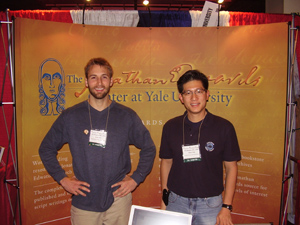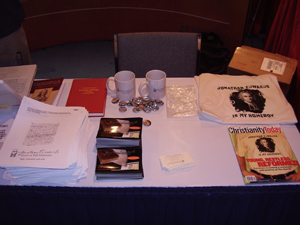"repeated blows on the head" etc.
In between lashes from the hard-driving whip of Herr Minkema's demanding editorial review, we have quite a bit of fun at the Jonathan Edwards Center. And this afternoon was no exception. As we toiled away on the issues and problems of the day, without warning the silence was torn by a peal of laughter from the front room. Our Fulbright Fellow, Anna Svetlikova, had come across the following passage from Religious Affections:
"It is as impossible, in the nature of things, that a holy and Christian hope be kept alive, in its clearness and strength, in such circumstances, as it is to keep the light in the room, when the candle is put out; or to maintain the bright sunshine in the air, when the sun is gone down.
Distant experiences, when darkened by present prevailing lust and corruption, never keep alive a gracious confidence and assurance; but that sickens and decays upon it, as necessarily as a little child by repeated blows on the head with a hammer. Nor is it at all to be lamented, that persons doubt of their state in such circumstances: but, on the contrary, it is desirable and every way best that they should. It is agreeable to that wise and merciful constitution of things, which God hath established, that it should be so. For so hath God contrived and constituted things, in his dispensations towards his own people, that when their love decays, and the exercises of it fail, or become weak, fear should arise; for then they need it to restrain them from sin, and to excite them to care for the good of their souls, and so to stir them up to watchfulness and diligence in religion: but God hath so ordered, that when love rises, and is in vigorous exercise, then fear should vanish, and be driven away; for then they need it not, having a higher and more excellent principle in exercise, to restrain them from sin, and stir them up to their duty."
The question here remains...does JE know that he's funny, or is it all a happy accident?
Inquiring minds want to know.
continue reading
"It is as impossible, in the nature of things, that a holy and Christian hope be kept alive, in its clearness and strength, in such circumstances, as it is to keep the light in the room, when the candle is put out; or to maintain the bright sunshine in the air, when the sun is gone down.
Distant experiences, when darkened by present prevailing lust and corruption, never keep alive a gracious confidence and assurance; but that sickens and decays upon it, as necessarily as a little child by repeated blows on the head with a hammer. Nor is it at all to be lamented, that persons doubt of their state in such circumstances: but, on the contrary, it is desirable and every way best that they should. It is agreeable to that wise and merciful constitution of things, which God hath established, that it should be so. For so hath God contrived and constituted things, in his dispensations towards his own people, that when their love decays, and the exercises of it fail, or become weak, fear should arise; for then they need it to restrain them from sin, and to excite them to care for the good of their souls, and so to stir them up to watchfulness and diligence in religion: but God hath so ordered, that when love rises, and is in vigorous exercise, then fear should vanish, and be driven away; for then they need it not, having a higher and more excellent principle in exercise, to restrain them from sin, and stir them up to their duty."
The question here remains...does JE know that he's funny, or is it all a happy accident?
Inquiring minds want to know.
continue reading




